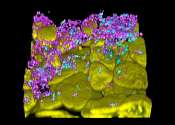A virus could help save billions of gallons of wastewater produced by fracking
An estimated 168 billion gallons of wastewater—or produced water—is generated annually by the Permian Basin fracking industry, according to a 2022 report by the Texas Produced Water Consortium. The major waste stream ...









